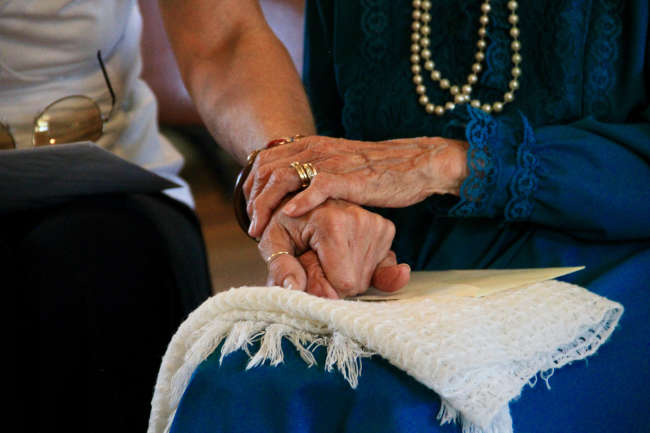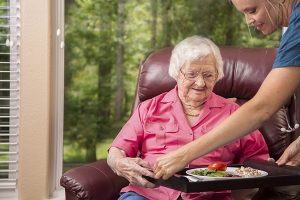
Are you an adult child in need of a checklist for taking care of elderly parents?
As an adult child looking after aging parents, you may not know how to plan for aging parents or how to take care of elderly parents. Having an elder care checklist can be beneficial as you begin helping aging parents because when it comes to aging parents’ elder care, there’s a lot to consider:
- Living situation
- Finances
- Legal matters and important papers for elderly adults
- Medical care
- Safety
Even though long-term care for elderly parents comes with many moving parts, you can get everything figured out.
In this article, we’re providing expert insight into aging parents and elder care. We’ll offer a senior care checklist for you to follow as you care for your loved one. You’ll also learn about one of the best options to care for elderly parents.
Keep reading to learn all about elder care for aging parents.
A Checklist For Taking Care of Elderly Parents
Knowing how to plan for aging parents is difficult for anyone, especially if you’re an adult child with your own life and responsibilities.
Fortunately, we’ve put together an elder care checklist for those helping aging parents.
Here are five areas to consider when thinking about long-term care for elderly parents.
Item #1: Living Situation
Your parents’ living situation is one of the first things you need to think about when it comes to aging parents and elder care.
Some of the most common housing options for elderly parents include:
- Moving your parents into your home: Caring for your parents at home is best for those who want to provide their parents with hands-on care themselves. It may be helpful to start a Care Coaching relationship with an experienced caregiver. They can help you know how to plan for aging parents and how to take care of elderly parents.
- Placing your parents in a senior living community: Many different elder care facilities, like independent living communities,nursing homes, and assisted living facilities, are available. These living arrangements often provide aging seniors with personal care, and some also offer medical assistance. However, many elderly adults want to age in place and don’t enjoy moving to a new residence.
- In-home care: Hiring your parents an in-home caregiver can provide the best of the above two options. Caregivers enter your parents’ (or your) home and give professional hands-on assistance to aging seniors. In addition, many home care companies offer respite care and 24-hour care, depending on your parents’ care needs.
There are many different housing options available to seniors, and the one that’s right for you will depend on your unique situation.
Item #2: Finances
Another valuable senior care checklist item is finances.
Your parents’ financial situation will affect the level of care they can afford. It also plays a role in the medical and other assistance they can receive.
A few things to check into include:
- Their social security payments
- Resources like supplemental security income and veterans benefits
- Insurance and retirement plans
If your parents don’t have the necessary financial resources for living, then the responsibility may fall on your shoulders. Fortunately, there are some tax breaks and federal deductions for full-time family caregivers you can also explore.
Item #3: Legal Matters
Legal matters are another area to consider when helping aging parents.
When it comes to your aging parents’ elder care, you may want to think about:
- Becoming an authorized user on your parents’ accounts
- Receiving power of attorney for your parents
- Drafting them a will (if they haven’t already done so)
There are also some important papers for elderly parents that you’ll want to have on hand:
- Birth certificates and social security cards
- Deeds to properties and/or cemetery plots
- Insurance policies
- Pension or employer benefits
You can look into some of these things yourself, but it may be helpful to consider talking with an elder law specialist. They can walk you through all legal matters and ensure that no stone is unturned.
Item #4: Medical Care
Item number four in our aging parents’ guide is medical care.
As you think about helping your elderly parents, it’s essential to understand their healthcare needs. Even if they don’t have a severe medical condition, they’ll likely need some sort of care now and then.
You can talk with your parents about their current medical needs and let them know you’re there to help. It may also be helpful to connect with your parent’s medical providers or attend a few of their appointments. If your parents don’t have a medical provider, you could assist them in finding one that they’re comfortable with.
It’s also a good idea to monitor your parent’s medications. You can regularly check in to ensure your parents are taking their pills and provide necessary help getting refills.
Taking part in your parent’s health journey can give you peace of mind that your parents are getting the help they need when they need it.
Item #5: Safety
No elder care checklist would be complete without a discussion about safety.
The safety measures you put in place will depend on what you decide about housing, but some areas to think about include:
- Home safety: Make sure that their living spaces are clean and tidy to avoid trips or falls. Install or tighten railings, especially railings associated with stairs. It’s also important to ensure rooms are well lit.
- Driving: As parents age, they may need to consider giving up their keys. Talk with them about this and consult with medical professionals. Offer to give them rides to and from their life activities.
- Monitoring: Sometimes, it can be beneficial to watch your parents when they’re at home or out in public. Many elder monitoring devices exist so that you can keep track of your parents. Wandering is a common symptom of dementia, so monitoring parents can be especially important for adult children with parents suffering from dementia.
Taking the time to think through your parents’ needs and some of the safety issues they may encounter can help prevent frustrations or serious injuries.
The Best Resources for Helping Aging Parents
If you’re an adult child looking after elderly loved ones, you’re not alone. Many adult children find themselves in the position of caregiver to aging parents but aren’t sure how to take care of elderly parents.
We decided to provide a checklist for taking care of elderly parents so that you’ll know what to do when it comes to caring for your loved ones. The top five areas to consider when helping aging parents include:
- Where your parents will live
- Your parents’ financial situation
- Legal matters and important papers for elderly adults
- Health and medical care
- Your parents’ safety
However, providing hands-on care to your parents may not be something you can handle on your own.
At Stowell Associates, we’re elder care experts who know what it takes to care for elderly adults. For nearly 40 years, we’ve dedicated ourselves to improving the quality of life for aging seniors through in-home care services. Our Care Managers and Caregivers are highly trained and equipped to handle simple or advanced care needs. We also offer a virtual Care Coaching service for family caregivers who are thinking about providing care for their loved ones themself.













